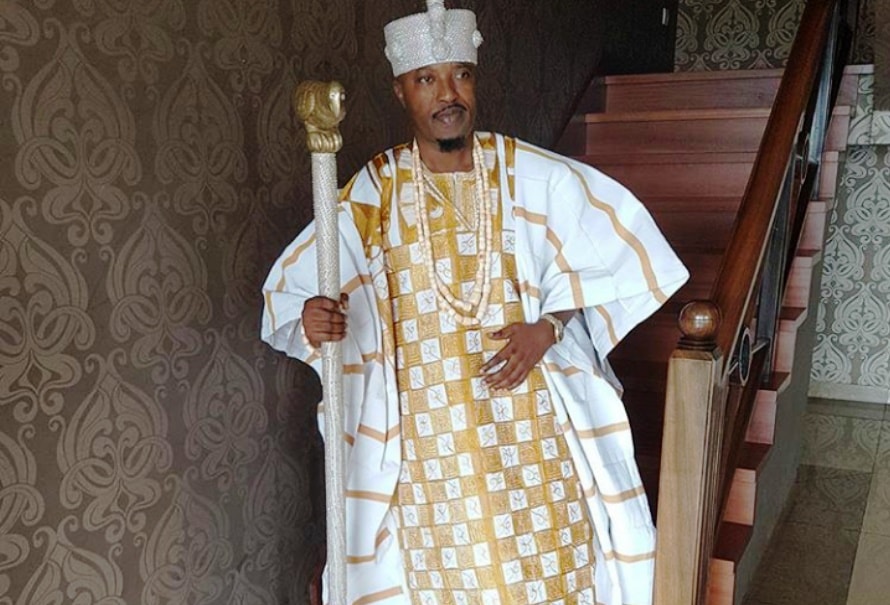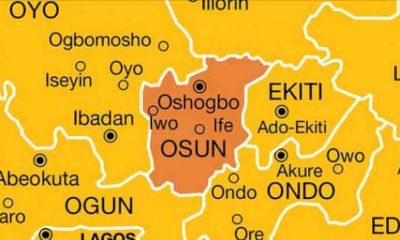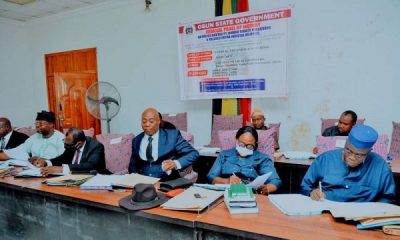Opinion
Slave Mentality: Why An Oba Became An Emir (I)

By Ahanonu Kingsley
The kingmakers of the prominent town of Iwo in Osun state, Southwest Nigeria, had in 2015 installed Abdulrasheed Adewale Akanbi as the new Gbaase of the land. But it seemed as they set out to effect their choice and finally landed the crown on his head, they were in for what they never bargained.
Not long after the new Oba was crowned, with the associated fanfare, that he began to act funnily, declaring in emphasis that his kingdom is a centre-piece for Islam in Yorubaland and how it is ‘the citadel of Islamic knowledge’.
Yes, it is understood how Iwoland is a predominantly muslim community, what seemed to be the spreadsheet of islam in the Southwest. But with the coming of the new king, people around and the world needed to know how that status is so cherished by and special to him.
He basked in that euphoria, and when the sultan of Sokoto, His Eminence Sa’ad Abubakar, paid him a visit, it just seemed- from whatever was the fallout of their meeting, that he was buoyed to assert, without mincing words, his love and admiration for the way the northern rulers decked and appeared in their style of royalty.
Oba Abdulrasheed Akanbi quickly started appearing in turbans and dressing in the heavy apparels as is unique in the paraphernalia of the northern muslim kings. Although his steps were strongly criticized by the many discerning elements who looked beyond the moment to see where the young man was headed, this was taken lightly by some few who just watched, and who had taken his new disposition as one that merely portrayed his likeness for the kingly fashion of the north.
As if that was not enough troubling dilemma, the people of the Yoruba southwest woke up, sometime around March 2018, to the traumatic realization of how the new young monarch of Iwo took his wacky admiration further to a sicking assertion. It was something they expected but which, nevertheless, beat their mind; of how that Oba Rasheed relinquished the customary moniker of his Yoruba royal stool to take up the muslim Fulani traditional title of Emir.
In strong will, the Gbaase of Iwoland declared that henceforth he’ll be referred to as the ‘Emir of Iwo’. It was a title that sounded awkward, especially in the part of a country that entirely and traditionally identifies their kings by Oba.
He said it as one that knew indeed what he did; he said it with such an affirmation that showed he was aware of what he did and feared no implications. The young man gave reasons for his action, saying it with all sense of clarity and straightness.
He said: “I have decided to officially adopt Emir title today because I want to emulate the attitudes of Northern Emirs. They don’t begrudge themselves (sic) like Yoruba Obas. It will surprise you to discover that for the past two years, there has not been meeting of Yoruba traditional rulers just because of enmity. There is nothing strange in adopting Emir title. I am the Emir of Yorubaland.”
Indeed, it is obvious that Abdulraaheed did what he did with his full senses. It is not hidden why he took the step that inches him closer to an identification with the muslim Fulanis and away from his Yoruba royal brotherhood. According to Vanguardngr.com, Akanbi said he decided to now bear “Emir of Iwoland” because he wants to emulate the attitudes of northern Emirs.
Believably, the action of the new-won and self-submitted Emir seems to portend a negativity, especially to the culture and tradition of the Yoruba, which obviously is the basis from which his claim to the throne and its privileges was drawn. It is akin to saying that he has turned around the ladder from the height which he had climbed to tinker with the foundation upon which the ladder stood. Does it work that way? Can he survive this seeming anathema? I leave it to the kingmakers and Yoruba traditionalists to answer.
However, beyond the cultural implications, the recent act of Oba/Emir Akanbi seeks to beg a question whose import would apparently seek to dig deeply further and into the history of the Uthman Dan Fodio wished conquest of the Yoruba nation and to a larger extent, the whole of Nigeria.
The last attempt of the Uthman Dan Fodio jihadist invasion, which happened to be the initial entrance into the Southern belt was the land of Kwara. Kwara was and still is majorly a Yoruba state. In the fiery flight of the jihad movement, this place gradually fell to the might of the Fulani warriors. It was at this point that the conquerors established their emirate -the first ever in Yorubaland.
Consequently, the Fulani dominated in the leadership structure in Kwara and subjected the people to their pattern of rulership. It is instructive to note that while it is the aboriginal community of Yorubas that dominated (population-wise), they were yet subject to the ruling class of the emirate. The vestige of this subjugation is still found today as the Ilorin Emirate.
Silently, it seems the conquest desire by the leader of the jihadist is been projected to further accomplishment by the natural descendants of Uthman, who happened to be the first Madi. In view of nationalism, these offspring of the madi might seem just to be for an integrated national being, they, however, still bear within them the sublateral blood that identifies them and demand their loyalty to the principal legacy.
They are Fulanis, they are the descendants and kins of their cherished lord and master, Uthman, and they are meant, by whatever inclination, to answer to the hegemonic call. Their submission to the establishment of Ottoman Empire must stir their commitment to the course to dominate and bring all to subjugation.
The unwritten yet clear tendency of the hegemonist to dominate has been made manifest by their assertions. It’s one mandate they have stated with, sometimes subtle judiciousness and sometimes open unambiguousness. The question is how else do we seek to grasp it?
On October 12, 1960, The Parrot Magazine quoted Sir Ahmadu Bello, the Premier of Northern Nigerias as saying: “The new nation called Nigeria should be an estate of our great grand father, Uthman Dan Fodio. We must ruthlessly prevent a change of power. We use the minorities in the north as willing tool and the south as a conquered territory and never allow them to rule over us and never allow them to have control over their future.”
[To be continued]
Ahanonu Kingsley writes from Owerri
Twitter: @kings_emz










Anonymous
April 3, 2018 at 10:43 pm
Yorubas are slaVes tribe, it’s has gradually manifesting